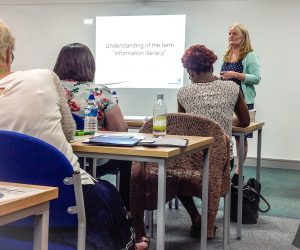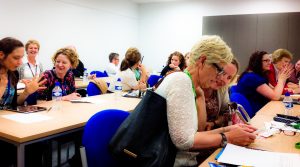By Richard Hopkins, Learning & Skills Librarian, University of Wolverhampton
Our first Teachmeet was entitled ‘Information literacy skills and the new student. What is innovative information literacy and skills practice? And how best do we promote it?’ and was an attempt to encourage conversation on issues that were of interest to the Skills for Learning team at the University of Wolverhampton and hopefully sector wide. This was our first attempt at organising such an event and there was a certain amount of trepidation as we uploaded it onto Eventbrite, I won’t deny there were some triumphant cheers as we watched places (both presenter and attendee) book quickly up. After a month or two of careful organisation the day was upon us and after warm welcomes from Trish Fouracres, assistant director (Learning and Information Services), and Lisa Thompson, learning and skills development manager, the room was packed and ready for our presenters to take the floor.
First up was Natasha Skeen, Community Liaison Librarian at the Hive at the University of Worcester. Using only two Argos catalogues and Ebay, Natasha demonstrated (with the aid of several willing volunteers) how to introduce pre-University students to the idea of filtering and refining their searches. Natasha had found these seemingly simple activities invaluable in transferring real world search concepts to HE study and judging from the feedback in the room many felt that similar tasks would benefit their students greatly. Although perhaps the real question here is how a room full of librarians ended up searching Ebay for a pair of size 5 red, vintage stilettoes on an otherwise quiet Thursday afternoon.
Next was Madeleine Rogers on from Harper Adams University on ‘Perceptions, practices and potential across the university’. Madeleine outlined the challenges and possibilities of defining an institution wide understanding of information literacy and how she had worked with academics to discover what they and their students needed from skills provision and what the key drivers were. A topic certainly relevant to our team, and obviously to many others in the room, as we constantly have to explore how to connect with staff and students and learn how to promote ourselves and information literacy within the wider institution.
on from Harper Adams University on ‘Perceptions, practices and potential across the university’. Madeleine outlined the challenges and possibilities of defining an institution wide understanding of information literacy and how she had worked with academics to discover what they and their students needed from skills provision and what the key drivers were. A topic certainly relevant to our team, and obviously to many others in the room, as we constantly have to explore how to connect with staff and students and learn how to promote ourselves and information literacy within the wider institution.
Emma Holgate and Kim McGowan from Cumbria University then introduced ‘Crossing the Line with Students: is that you or the other one?’ a talk on the challenges of their blended role of information literacy skills and academic literacy skills support. They then went on to describe an innovative student support case study based around assignment feedback which involved collaboration between students, lecturers, programme leaders and information literacy professionals. Judging by the amount of discussion generated in the room, and online, attendees found this of particular interest and as a member of the Skills and Learning team at the University of Wolverhampton whose role is similarly blurred between Information Literacy and academic study skills support it was highly relevant.
At this point we took a break for cake and biscuits, handsomely sponsored by ILG, allowing attendees to network and take a look at some of the learning resources we use within our team (to find out more then please visit www.wlv.ac.uk/skills or our Youtube channel). We had attempted to make the afternoon as informal as possible and encourage conversation so it was really gratifying to hear from attendees that they “very much enjoyed networking”. The biscuits and cakes had certainly diminished by the end of the break although this is perhaps solely down to your correspondent’s voracious appetite for Jaffa cakes.
Carol Bailey, senior lecturer and co-ordinator of Postgraduate Academic English Language Development at the University of Wolverhampton, then introduced ‘Where are they coming from? Information literacy skills and the new international student.’ Carol began by emphasising that there is no such thing as a typical international student, that all come from such incredibly different backgrounds that to generalise would be limiting. Carol then illustrated the point with a number of illuminating quotes from international students on the difficulties they faced when faced with reading lists, referencing conventions and academic writing at University. As a member of staff that frequently deals with international students and their academic study skills in both workshop and one to one situations this resonated with me and was thought provoking.
Jackie McCarthy of Harper Adams University ended the day with ‘Harper Adams Supporting International Distance Learners’ an account of how she facilitated Harper Adams’ information literacy programmes in a Beijing partner university and the challenges that presented themselves in both cultural and practical terms. Jackie provided some practical advice to the audience and as one attendee pointed out “Most of the participants experience a similar range of issues- and some have solutions to the issues we expeience.”
We wanted to capture as much feedback and conversation around the event as possible so we made sure to utilise Twitter with a hashtag, #wlvskills, and some dedicated tweeters within our team to tweet along with the talks. As well as creating conversation around the presentations and hopefully allowing attendees to network it also enabled us to subsequently compile the conversation into a Storify which hopefully captures a flavour of the day as well as refreshing our ailing memories.
We also set up a Padlet for the day. We hadn’t used this website before but it proved to be a useful means of posting online stickies and allowed attendees to comment and feedback on the day with one noting that they appreciated that there were “various ways to engage” during the day. We left it open for a week after the event to allow any further questions.
And what would we do differently next time? Well, an attendee list in the welcome packs was one obvious thing that we missed and hot water bottles to compensate for our overly enthusiastic air conditioning unit might have helped. We had wondered whether to make the event a full day but feedback seemed to suggest that we had made the right choice with positive comments on “the short bursts of presentations followed by question and answer sessions” and “…a half day teachmeet is much more manageable to attend.” Other than that we felt it was a successful event and would like to thank all the presenters and everyone that attended that made it such a useful and enjoyable afternoon.
Slideshare: www.slideshare.net/wlvskills
Storify: https://storify.com/wlvskills/wolverhampton-teachmeet
Padlet: http://padlet.com/wlv/teachmeet
